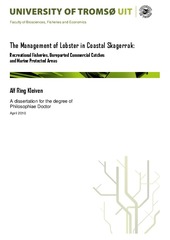Seeking to legitimize: Social sustainability and legitimacy in the Traffic Light System
Permanent lenke
https://hdl.handle.net/10037/16142Dato
2019-05-15Type
Master thesisMastergradsoppgave
Forfatter
Vik, ChristianSammendrag
Over the last 50 years, the management needs of the Norwegian aquaculture industry have become increasingly complex. The stakeholders in the management vary diversely from environmental agencies and NGOs, to local and national governmental bodies, to those operating the farms themselves. Consequently, the establishment of the Traffic Light System as a management tool has been a long and challenging process. There has been a great deal of criticism regarding its inbuilt collective punishment with regards to capacity reduction. To avoid this, the authorities have created exemption rules to the action rule, commonly referred to as §12. This paper explores how the exemption rules (§12) affect the legitimacy and social acceptance of the Traffic Light System. Moreover, it seeks to understand how the Traffic Light System affects the social sustainability of the Norwegian aquaculture industry more broadly. The design of the paper is qualitative research in the form of document analysis and formal structured interview. Three different farmers, one representative from the NFSA and one from the Directorate of Fisheries were interviewed individually by phone. White papers, consultation documents, hearings and applications were scrutinized in the document analysis. The findings indicate a lack of trust towards those creating the management structures. With such a system in place, an exception rule is deemed absolutely necessary. The study shows that the criticism towards the TLS was so strong that there may not have been enough support to establish such a system without exception rules. The exception rules allow the TLS to be accepted, with the consequences that the aquaculture industry is managed with regards to its impact on the environment. The study reveals that there is no use of discretion when handling the exception rule, and this is both positively and negatively viewed by those surveyed. Importantly, the study demonstrates that in spite of §12, there still exist strong doubts from the farmers towards the TLS, indicating a persisting lack of content legitimacy. Yet there is also a sense of understanding that the TLS - aided significantly by the instigation of §12 – is the start of a new management system, which despite needing further research, could become a valid management structure for the industry. Overall, the fragility of the social sustainability of Norway’s aquaculture industry will depend heavily on the continuation of both economic and environmental sustainability.
Forlag
UiT The Arctic University of NorwayUiT Norges arktiske universitet
Metadata
Vis full innførselSamlinger
Copyright 2019 The Author(s)
Følgende lisensfil er knyttet til denne innførselen:
Med mindre det står noe annet, er denne innførselens lisens beskrevet som Attribution-NonCommercial-ShareAlike 4.0 International (CC BY-NC-SA 4.0)
Relaterte innførsler
Viser innførsler relatert til tittel, forfatter og emneord.
-
Levendelagret rødspette (Pleuronectes platessa) – velferd og kvalitet
Pettersen, Ingrid Marie; Aaknes, Vilde Synnøve (Master thesis; Mastergradsoppgave, 2023-05-15)I dag er verdikjeden for fisk og skalldyr bygget opp rundt utnyttelse av et fåtall arter som kan fanges i store volum og med høy markedsverdi. Bruk av lite eller ikke utnyttede marine ressurser kan være en bærekraftig tilnærming for å innfri fremtidige krav og etterspørsel til fiskekonsum. Rødspette (Pleuronectes platessa) er den viktigste flatfisken i volum og verdi i europeiske fiskerier. Både ... -
The management of lobster in coastal Skagerrak : recreational fisheries, unreported commercial catches andmarine protected areas
Kleiven, Alf Ring (Doctoral thesis; Doktorgradsavhandling, 2010-09-30)The implementation of four experimental lobster reserves in Norway in 2006 highlighted a set of important questions regarding lobster management. This thesis presents a study on the management and fishery of the European lobster (Homarus gammarus) in Skagerrak. Firstly, the implementation process of the lobster reserves was analysed. It revealed that local stakeholders, such as recreational fishers, ... -
Granularity and its importance for traceability in seafood supply chains
Karlsen, Kine Mari (Doctoral thesis; Doktorgradsavhandling, 2011-08-26)The purpose of this thesis was to study granularity and its importance for traceability in seafood supply chains. The following hypothesis was applied in this thesis: The implementation of traceability of seafood is affected by the granularity level of the traceable units. Three sub-tasks were carried out to test the hypothesis: 1) identify critical traceability points (CTPs) of seafood products, ...


 English
English norsk
norsk



